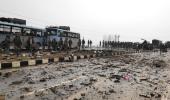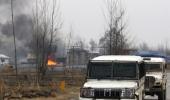'In the last 55 years India and Pakistan have gone to wars, but nobody spoke about scrapping the Indus Waters Treaty.'

Amidst anger over the Pulwama terror attack, Union Water Resources Minister Nitin Gadkari announced the decision to 'stop' India's share of water of three rivers -- the Ravi, Beas and Sutlej -- 'which used to flow to Pakistan'.
As per the 1960 Indus Water Treaty governing six common rivers, India has full rights over the Ravi, Beas and Sutlej rivers while Pakistan has full rights over the Jhelum, Chenab and Indus.
However, an official clarified that it was not a 'new decision' and that Gadkari was 'simply reiterating' what he has always said.
A similar demand for scrapping the Indus Water Treaty altogether was raised in the aftermath of the attack in Uri in September 2016 in which over 20 soldiers died.
The treaty, signed in 1960, has been the most successful treaty between India and Pakistan lining out the water sharing arrangement between the two nations.
In the aftermath of the Uri attacks, Dr Shakil Ahmad Romshoo, head of the earth sciences, geology and geophysics departments, University of Kashmir, explained to Rediff.com's Syed Firdaus Ashraf why it is not possible to scrap the Indus Waters Treaty.
There is a view that India needs to scrap the Indus Waters Treaty and cut off water supply to Pakistan. Is that possible?
People who talk about scrapping this treaty have no technical understanding. I don't think it can be done.
India is an emerging power and it is aspiring to become a permanent member of the United Nation Security Council, so I don't think you can scrap an international bilateral treaty which also involved the World Bank.
In this treaty we have divided six rivers. Three rivers on the eastern front are given to India. On the western side three rivers have been given exclusively to Pakistan.
This is a win-win situation. Both countries are happy and this is why the treaty has been working so well for the last 56 years.
Will the World Bank step in if India abrogates this treaty?
For many reasons it is not possible. Both countries are happy about this treaty. There are so many trans-boundary rivers in the world and countries have to find a mechanism to share water.
All over the world the Indus Waters Treaty is referred as our most successful treaty.
In the last 55 years India and Pakistan have gone to wars in 1965 then 1971 and Kargil too, but nobody spoke in past about scrapping this treaty.
At this moment we are sharing water with Bangladesh and Nepal too.
If we scrap this treaty we will scare these countries as well. So you should check out who is talking about scrapping this treaty. These are military generals or hawks. I don't think officially this is India's position.
Vikas Swarup, the (then) ministry of external affairs spokesperson, hinted at this.
He said treaties depend on goodwill. That is what he said. That's all. And that is a fact.
India and Pakistan are in conflict over Kashmir and you can't open another front. I don't think we can afford to do that now.
There is lot of insecurity in Pakistan too because they feel India is controlling the water despite the fact that this treaty is running very well.
I have not heard anyone in Pakistan talking about scrapping this treaty because I believe they cannot get anything better than this treaty.
There is a belief that scrapping this treaty would teach Pakistan a lesson.
Technically, it is not possible. Even if you put infrastructure to do so, it will take you 10 to 15 years to build (canals to divert the water).
J&K is a mountainous state and you will have to build canals to take the water out of the state.
Can you explain how many rivers flow from India to Pakistan?
There are six rivers. On the eastern front we have the Sutlej, Beas and Ravi for which rights have been given exclusively to India in the treaty.
On the western front we have the Indus, Jhelum and Chenab.
The rights of these rivers are given to Pakistan except the fact that some water is used from these rivers for J&K for the purpose of hydropower generation, for domestic use and for agriculture. The rest of the water is released to Pakistan.

What can be the implications for Pakistan if we stop the water?
You cannot do that and let us assume we stop the water supply for the sake of argument. Where would the water go?
We do not have infrastructure to store this water. We have not build dams in J&K where we can store the water. And being a mountainous state, unlike Tamil Nadu or Karnataka, you cannot move water to another state. So you cannot stop water technically.
Take another example of water flowing from Uttarakhand or Himachal Pradesh. We do not leave this water to Pakistan, but use it in Rajasthan.
Will there be flooding in India if we stop the river waters from entering Pakistan?
Yes, the Kashmir valley will flood as will Jammu. You just don't have the storage capacity.
We never developed diversion canals which could have taken this water to some other state. In Kashmir you do not need too much water for irrigation purposes.
If you look at the Indus Waters Treaty, India is entitled to store water, but has failed to develop that infrastructure in J&K.
The People's Democratic Party has always stated that J&K suffers losses because of the Indus Waters Treaty.
That is a different aspect. If you see this treaty you will find that the people of J&K can use the water for non-consumption. We can use it for electricity.
We cannot have dam projects. Even the National Conference had argued that this treaty was negotiated during 1960 and that the people of J&K were not taken into confidence and their government should be given compensation. These political parties were objecting because there are several restrictions on the usage of water.
What is the role of the Indus commissioner?
This treaty has set up a very good grievances redressal mechanism. Each country has its commissioner. If there is a dispute these two commissioners meet to sort out the problem.
If they cannot reach an agreement, then they go to the foreign secretary level and failing that, the government. If the problem is not solved there as well, then they go to a neutral expert.
That neutral expert panel is decided by these two countries. In the past neutral experts were from Europe and the US. Now even if they fail, then the issue goes to the International Court of Justice.
Recently, we went to a neutral expert for the Kishanganga project in J&K where the decision went in India's favour. However, on appeal, the case went to the court of arbitration where the decision went in Pakistan's favour.










